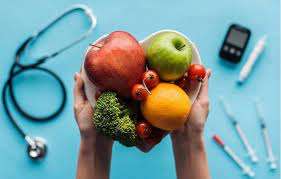Fueling Your Body: The Power of Nutrition
Nutrition is the foundation of good health and plays a crucial role in fueling your body for optimal performance and well-being. The foods you eat provide essential nutrients that support bodily functions, energy production, and overall vitality. In this article, we will explore the power of nutrition and how making informed dietary choices can lead to a healthier and more fulfilling life.
1. Embrace a Balanced Diet
A balanced diet includes a variety of foods from different food groups to ensure you receive a wide range of nutrients. Aim to include fruits, vegetables, whole grains, lean proteins, and healthy fats in your daily meals. This diverse combination supports your body’s needs and promotes overall health.
2. Prioritize Nutrient-Dense Foods
Nutrient-dense foods are rich in essential nutrients relative to their calorie content. These foods, such as leafy greens, nuts, seeds, and lean proteins, provide a wealth of vitamins, minerals, and antioxidants that support cellular function and protect against diseases.
3. Stay Hydrated
Water is essential for life, and staying hydrated is critical for various bodily functions. Aim to drink an adequate amount of water throughout the day to support digestion, nutrient absorption, and toxin elimination.
4. Limit Added Sugars and Processed Foods
Excessive consumption of added sugars and processed foods can lead to health issues such as obesity, diabetes, and heart disease. Minimize your intake of sugary beverages, sweets, and processed snacks, and opt for whole, unprocessed foods whenever possible.
5. Incorporate Healthy Fats
Healthy fats, such as those found in avocados, nuts, seeds, and olive oil, are essential for brain health, hormone production, and nutrient absorption. Include these fats in your diet to support overall well-being.
6. Choose Whole Grains
Opt for whole grains over refined grains to ensure you receive the full spectrum of nutrients and dietary fiber. Whole grains, like quinoa, brown rice, and oats, help stabilize blood sugar levels and support digestive health.
7. Include Lean Proteins
Proteins are the building blocks of the body and are essential for muscle repair, immune function, and hormone production. Incorporate lean sources of protein, such as chicken, fish, legumes, and tofu, into your meals.
8. Mindful Eating
Practice mindful eating by paying attention to hunger and fullness cues. Avoid distractions while eating, such as television or smartphones, to savor the flavors and textures of your food fully.
9. Plan and Prepare Meals
Planning and preparing meals in advance can help you make healthier choices and avoid reliance on convenience foods. It also allows you to create well-balanced and nutritious meals tailored to your dietary preferences.
10. Listen to Your Body
Each person’s nutritional needs may vary, so it’s essential to listen to your body and respond to its cues. Pay attention to how different foods make you feel and adjust your diet accordingly.
11. Consider Dietary Restrictions and Allergies
If you have dietary restrictions or allergies, it’s crucial to find alternative sources of nutrients to ensure you meet your nutritional needs. Consult with a registered dietitian for personalized guidance.
12. Supplement Wisely
While a balanced diet should provide most of the nutrients your body needs, some individuals may require supplements to address specific deficiencies. Consult a healthcare professional before taking any supplements.
13. Avoid Fad Diets
Fad diets often promise quick results but may not provide a sustainable approach to nutrition. Focus on long-term lifestyle changes that promote health and well-being.
14. Enjoy Food in Moderation
Savor your favorite treats in moderation without guilt. Allowing yourself occasional indulgences can help you maintain a healthy relationship with food.
15. Educate Yourself About Nutrition
Stay informed about nutrition by reading reputable sources and staying up-to-date with the latest research. Knowledge empowers you to make informed choices for your well-being.
16. The Role of Nutrition in Disease Prevention
Nutrition plays a vital role in disease prevention by supporting a robust immune system and reducing the risk of chronic conditions. A diet rich in antioxidants from fruits and vegetables helps neutralize free radicals and protects cells from damage. Consuming foods high in fiber supports digestive health and may lower the risk of conditions like colorectal cancer. Additionally, adequate intake of vitamins and minerals contributes to overall immune function, promoting resilience against infections and illnesses.
17. Hydration for Optimal Health
Staying hydrated is essential for maintaining optimal health. Water supports various bodily functions, including temperature regulation, nutrient transport, and joint lubrication. It also aids in the elimination of waste products. Drinking enough water throughout the day helps prevent dehydration, which can lead to fatigue, headaches, and reduced cognitive function.
18. Nutrition for Athletes and Physical Performance
Athletes and active individuals have unique nutritional needs to support their physical performance and recovery. Adequate protein intake is essential for muscle repair and growth. Carbohydrates provide a primary source of energy for exercise, while healthy fats contribute to long-lasting endurance. Proper hydration and electrolyte balance are critical during physical activity to prevent dehydration and muscle cramps.
19. Nutrition During Pregnancy and Lactation
Proper nutrition during pregnancy and lactation is crucial for the health of both the mother and the baby. Pregnant women require increased nutrients to support fetal development, including folic acid, iron, calcium, and omega-3 fatty acids. Breastfeeding mothers should focus on a nutrient-dense diet to provide essential nutrients to their babies through breast milk.
20. The Impact of Nutrition on Skin Health
Nutrition plays a role in maintaining healthy and radiant skin. Foods rich in antioxidants, such as vitamins A, C, and E, help protect the skin from damage caused by UV rays and environmental pollutants. Omega-3 fatty acids contribute to skin hydration and reduce inflammation. Hydration also plays a crucial role in maintaining skin elasticity and overall appearance.
21. Nutrition for Healthy Aging
As we age, our nutritional needs may change. Consuming a diet rich in nutrients supports healthy aging and reduces the risk of age-related conditions, such as osteoporosis and cognitive decline. Adequate protein intake is vital for preserving muscle mass and strength, while antioxidants help combat oxidative stress associated with aging.
22. Addressing Food Insecurity and Nutrition Disparities
Access to nutritious food is a fundamental human right. Addressing food insecurity and nutrition disparities is essential for promoting health equity. Initiatives such as community gardens, food assistance programs, and education on healthy eating can help improve access to nutritious foods for vulnerable populations.
23. The Role of Nutrition in Mental Health
Emerging research suggests that nutrition plays a role in mental health. Nutrient-dense diets that include omega-3 fatty acids, B vitamins, and antioxidants may support emotional well-being and reduce the risk of mood disorders. Additionally, gut health and the gut-brain axis have been linked to mental health, highlighting the importance of a balanced and diverse diet.
24. Practicing Sustainable and Ethical Nutrition
Choosing sustainable and ethical food sources is not only beneficial for the environment but also for personal health. Emphasizing plant-based foods, reducing food waste, and supporting local and organic agriculture contribute to a more sustainable food system and a healthier planet.
25. Seeking Professional Guidance
Individual nutritional needs vary based on factors such as age, gender, activity level, and health conditions. Consulting with a registered dietitian or nutritionist can provide personalized guidance and support in developing a nutrition plan that suits your unique needs and goals.
Conclusion
Nutrition is a powerful tool for optimizing health and well-being. By embracing a balanced and mindful approach to food, you can nourish your body with the essential nutrients it needs to thrive. Remember that small, sustainable changes to your diet can have a profound impact on your overall health and vitality. Prioritize nutrition as a key component of your journey towards a healthier and more fulfilling life.
FAQs
- How can nutrition impact overall health?
- Nutrition provides essential nutrients that support bodily functions, immune health, and energy production. A balanced diet contributes to better overall health and reduces the risk of chronic diseases.
- Can I achieve optimal nutrition on a vegetarian or vegan diet?
- Yes, a well-planned vegetarian or vegan diet can provide all the necessary nutrients. Pay attention to sources of protein, iron, vitamin B12, and omega-3 fatty acids to meet nutritional needs.
- Should I follow a specific diet trend for optimal health?
- Focus on a balanced diet with a variety of whole foods rather than following diet trends. Personalized dietary choices based on individual needs are more sustainable and effective for long-term health.
- Can nutrition impact mental health?
- Yes, nutrition plays a role in mental health. Nutrient-dense foods support brain function, and certain nutrients are linked to mood regulation and cognitive health.
- Can I indulge in my favorite treats and maintain a healthy diet?
- Yes, enjoying treats in moderation as part of a balanced diet is acceptable. The key is moderation and overall healthy eating habits.
- Can I still enjoy my favorite foods while maintaining a healthy diet?
- Yes, enjoying occasional treats is acceptable as part of a balanced diet. Moderation and mindful eating are key to maintaining a healthy relationship with food.
- Can nutrition impact energy levels and productivity?
- Yes, proper nutrition supports sustained energy levels and cognitive function, positively influencing productivity and focus throughout the day.
- Is organic food more nutritious than conventionally grown food?
- While organic foods may have lower pesticide residues, the nutritional differences between organic and conventionally grown foods are generally minimal. Prioritize a varied and nutrient-dense diet, regardless of the farming method.
- Can supplements replace a healthy diet?
- Supplements are intended to complement a balanced diet, not replace it. While some individuals may benefit from specific supplements, whole foods provide a more comprehensive array of nutrients.
- Is intermittent fasting a healthy approach to nutrition?
- Intermittent fasting may offer health benefits for some individuals, but it may not be suitable for everyone. Consulting with a healthcare professional or registered dietitian is recommended before starting any fasting regimen.
Do follow us for more https://uniqverses.com/










One thought on “Fueling Your Body: The Power of Nutrition”